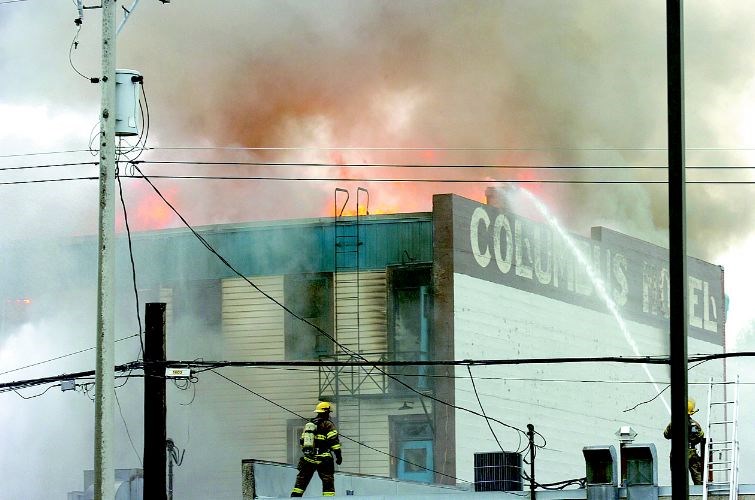Municipalities across B.C. could be on the hook for unprecedented insurance expenditures if Prince George businessman Rob Gibson wins again in court.
The former owner of the Columbus Hotel is representing himself in court proceedings between the City of Prince George and the Columbus Hotel Company.
"The city really opened up a can of worms, because they could have worked out a settlement with me back at the start and avoided court altogether," said Gibson. "Now a judge has ruled against their claims and it could set the standard for the whole province, every municipality that takes over any land when someone defaults on their taxes."
The hotel company was sued by the City of Prince George for $175,000 in costs for cleaning up after a Aug. 19, 2008 fire that gutted the building.
At the time of the fire, the hotel and its land was owned by the City of Prince George. The city bought it in a tax sale effective Sept. 24, 2007 and Gibson was in the legally obligatory one-year redemption period in which he could pay the amount owed and get the property back.
He had not done so at the time of the fire.
So Gibson was actually the "occupier" of the property, not "owner." And the contention was that parts of the Community Charter and Local Government Act expressly stipulate that occupiers can be billed for cleanup of waste.
However a B.C. Supreme Court judge disagreed with the city's interpretation.
"The demolition and debris removal expense incurred in the case at bar was a consequence of fire. It cannot be said in this case that destruction of the occupied property... constitutes waste by the occupant," stated Justice Peter Willcock. "There is no evidence the occupant allowed the property to fall into a state of disrepair."
Furthermore, Willcock observed "neither the Local Government Act nor the Charter specifies whether the owner or occupier must ultimately bear the burden of the cost of remedial action."
This raises the specter of insurance. If it is not automatically known whether a municipality or an occupier has to pay for any unforeseen costs that might suddenly occur, the ruling implies it would behoove the municipality to have to invest in insurance for that property.
"The owner clearly has an interest in the property that should be insured," Willcock stated.
"The occupier should insure its limited interest in the property (assuming it has some insurable interest) and insure against liability for property damage for which it may be liable. There is nothing inequitable in restricting the liability of mere occupiers to liability arising out of the occupiers' own acts or omissions and liability imposed under the Occupiers Liability Act."
The city appealed Willcock's ruling and that appeal will be heard today at a rare appearance by the BC Court of Appeal in Prince George.
"As this matter is before the British Columbia Court of Appeal, we will add no further comment at this time except to say that the city looks forward to the court's decision on the appeal," said city spokesman Mike Davis.
Gibson said he wanted to work things out with the city to continue owning the property and to rebuild the hotel and bar. That option was rushed to a close by a city council vote against waiting further, while across the parking lot less than a block away, the Caine Building was totalled by fire in May 2007 and its hulk was still standing more than two years later.
"They don't really give a rat's [behind] about me," said Gibson. "They have to appeal, they have to win, because if I win, every time a municipality takes over a property in a tax sale they will have to invest in insurance for any cleanup or anything else that might happen on that property.
"If they had settled out of court in the first place, this never would have happened. Now they've stuck the province with a legal precedence, and this makes them look pretty stupid."



